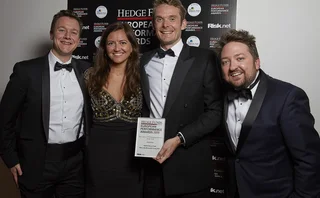
The objective advocate
Stephen Oxley and the team at PAAMCO have taken in $500m from institutional investors since opening an office in London. Here, Oxley casts an eye over the past year and looks to the future for hedge fund investment
Some may call Stephen Oxley a 'poacher turned gamekeeper' in his present role as managing director in Europe of fund of hedge fund manager Pacific Alternative Asset Management Company (PAAMCO).
His move to US and London-based PAAMCO from a major investment consultant - where he was head of the European hedge fund manager research team - did indeed signal a move from assessing funds of hedge funds (FoHFs), for pension funds, to whom he now sells them.
But his move to PAAMCO has not seen his stance on hedge funds - which he sees as broadly suitable, depending on the client's needs - change.
His involvement in the alternative class has been a long one. Before his pension consultancy work Oxley had conducted seminal research on hedge funds, back in 1994, with institutional research house InterSec, together with the European Managed Futures Association (now AIMA), and a company, far smaller back then, called ED&F Man.
At PAAMCO, the success of Oxley and his team is shown by the firm celebrating its first birthday in September 2004 with around $500m under management in fund of fund products and managed accounts, a sizeable portion of the $6bn PAAMCO, established in 2000, manages worldwide.
Oxley and his team has developed relationships with 10 clients - all institutional - more than half of whom measured by assets are pension funds, within PAAMCO's target market of "large blue-chip institutions."
"Our founding partners have all worked with institutional finance and it's where we like working," Oxley explains. "I think institutions appreciate the way we're structured and they like the way we do our risk management, reporting and transparency, all of an institutional standard.
"We have been particularly successful in Holland," Oxley says, "where we have four pension fund clients and are expecting a couple more. The Dutch funds are quite advanced in terms of allocating to hedge funds and we have also developed clients in Scandinavia, Germany and the UK.
"Hermes has said publicly there are very few funds of hedge funds that are truly institutional and I say that from my perspective of my being able to look at the industry objectively. Even though there are 80 funds of hedge funds with more than $1bn the resources and number of people and experience and compliance and risk management needs to be in place.
"Although some of the formerly private client focused funds of hedge funds are getting longer in the tooth often when institutions look at them they will come to the conclusion they do not have the infrastructure an institution will need."
PAAMCO can offer its clients managed accounts, pure advisory services, as it offers to CalPERS, or funds of hedge funds as it does to the Pennsylvania Pension Plan. Its fund of funds include a market neutral (US onshore) and a multi-strategy (onshore and offshore) product.
Its multi-strategy returned 13.2% net in 2003 and was up around 3% to mid-September. The ready-made products include co-mingled funds in euro, dollar and sterling, broadly diversified between 25 and 45 funds, low volatility and expected returns 5%-6% over cash with low correlation to equity markets. Neither geographically focused nor single strategy funds, nor incubation is on PAAMCO's plans.
A firm advocate of the alternative class, Oxley notes he was never anti-hedge funds, even at a time when it was a brave European trustee who admitted to heavy investment or even interest in the area.
"I wouldn't say as a consultant I was 100% pro-hedge funds, though, because I didn't think it was right for certain funds," he explains, "it was always if the circumstances were right, if the fund had the governance structure and if it could be effectively implemented, then it made sense."
Oxley gained wide press and industry exposure in the 1990s as head of one of the first consultant teams in the UK and Europe to emphasise pension funds at least consider the emerging asset class. Since his days consulting, many have entered hedge funds, from ABP in Holland with internal funds of funds, to California's CalPERS and the UK's BT plans outsourcing research, to MN Services and Skandia taking a mix of single and multi-fund products.
While UK local authorities such as those from London Borough of Brent, South Yorkshire, Shropshire, Dorset, and more presently invest via funds of hedge funds, Oxley says as sophistication grows, a hybrid model of outsourced fund of funds and in-house single fund selection may increase.
While some fund of hedge fund managers may feel they have lost one of the key 'objective advocates' of hedge funds' advantages - into their own ranks, at PAAMCO - Oxley remains committed to explaining both the advantages and potential drawbacks of funds of hedge funds both generally, and of PAAMCO's range of funds in particular.
"When (the consulting firm) made the decision their clients should consider alternatives…it was the end of the bull market and equities were a great thing. The story for hedge funds went down best with the clients who were prepared to give (the consultants) more discretion," he says. Since then, Oxley adds, some consultants have become more skeptical, not less, about hedge funds as they have grown, and suffered a blip in performance in the past four months.
Does Oxley feel alpha is sustainable at current levels or is hedge funds' recent performance blip part of a downward spiral? "The returns may result in a temporary slowdown in allocations from institutions - probably not a bad thing for the industry if we see next year as being slower - but I still think these strategies, provided you get your manager selection right, provide opportunities for both diversification and alpha.
"But you have to be reasonable in your expectations of what the alpha is 'over'. It's probably over cash and most institutions would have long term expected returns from equities of somewhere between 5%-6% real, and most reasonable investors in diversified funds of hedge funds would have similar expected returns."
While he sees no immediate problem with alpha generation by the better hedge fund managers, he does, however, see some tensions between a fund of fund industry traditionally catering to high-net-worth return-seekers and an institutional base putting alpha not correlated to markets and risk control ahead of 'returns at any cost'.
Managing expectation
"Private clients are still seeking high returns, they're much more into absolute returns, prepared to take volatility and are much more momentum-based. Institutions are generally looking for something with reasonable alpha expectations and outperformance expectations, but they're possibly more realistic in their expectations. They're also looking for something that will diversify what they have already.
"Hedge funds normally only make up 5-10% of their portfolios…so their real risk exposures are elsewhere."
Oxley notes the larger Continental pension funds generally dedicate more staff to alternatives than their UK counterparts, not only with larger funds "but even at E1bn, Continental funds have a bit more resource than similarly sized UK funds.
"In the UK, you have the pension manager, board of trustees and consultant. In the Continent there would probably be a couple of more investment-savvy professionals working for the pension fund making investment decisions, whether managing the portfolio internally or appointing external managers. In some Dutch funds, you have what is almost a kind of internal consulting group."
Despite Oxley seeing more pension funds, Dutch and Scandinavian foremost, allocating directly to single funds either as well as or instead of funds of funds - a task PAAMCO also helps investors with in a consultative capacity - he does not see the main threat to funds of hedge funds coming from institutions 'insourcing' fund selection.
underlying issues
With pension funds insourcing, he notes, "the issue is the relationship with the underlying manager. If a FoHF is appointed by a pension fund putting in $500m, the pension may say: 'We'll give the money directly,' but that's not so easy.
"The underlying managers often have quite close relationships to the FoHF and the FoHF is growing and can reallocate that money, so your (pension) client redeems, you find someone else to replace them and then the pension is knocking at the door looking for extra capacity. Also, our turnover rate is 20-25% a year so if a pension fund's is the same they will have changed completely in four years. The question is, can they find that many appropriate new managers?"
Portable alpha
Popular in the US and advocated by Stephen Oxley, portable alpha as an effective risk budgeting strategy increasingly prevalent among European institutions.
"As a pension fund, you have your benchmark matched to your liabilities and you take risk by investing in equities usually…to reduce the long-term funding gap. You ask your active managers to try to beat the strategic benchmark."
If they fail, says Oxley bluntly, "you're wasting your risk budget in that area."
"Would it not be better," he then asks, "to buy the market through a very cheap index product and separately seek some pure alpha, absolute returns with no beta? This is one of the reasons we run our funds with very low beta. Many of our clients have plenty of exposure to (beta) through the rest of their portfolio, they want as much alpha as they can get. We, in effect, have become the active risk budget."
But aren't FoHFs an expensive use of a risk budget? Not according to Oxley. "Let us assume your average long-only active manager has a 10% tracking error - probably an exaggeration - and charge 50bps. So 90% of it is an index fund, or beta, so 50bp could be actively managed in 10% of your portfolio.
"Though a fund of hedge funds may cost 400bp you have 100% active management, which ends up being cheaper. Not only that, but the history would seem to indicate hedge funds are more successful giving you active return. There is an argument for rethinking how you manage your portfolio and hedge funds have a place in that in the same way they have a role if you just want some diversification."
manager: stephen oxley
Stephen is managing director of Pacific Alternative Asset Management Company, Europe (PAAMCO), an institutional fund of hedge funds firm based in California. It manages $5bn in multi-manager hedge fund portfolios for clients that include many large pension funds. Oxley is a member of the investment management committee and is responsible for managing the firm's London office and developing relationships with European institutions. Before joining he was a partner and senior investment consultant at Watson Wyatt, LLP in the UK, responsible for advising European pension funds on their investment arrangements.
Only users who have a paid subscription or are part of a corporate subscription are able to print or copy content.
To access these options, along with all other subscription benefits, please contact info@risk.net or view our subscription options here: http://subscriptions.risk.net/subscribe
You are currently unable to print this content. Please contact info@risk.net to find out more.
You are currently unable to copy this content. Please contact info@risk.net to find out more.
Copyright Infopro Digital Limited. All rights reserved.
You may share this content using our article tools. Printing this content is for the sole use of the Authorised User (named subscriber), as outlined in our terms and conditions - https://www.infopro-insight.com/terms-conditions/insight-subscriptions/
If you would like to purchase additional rights please email info@risk.net
Copyright Infopro Digital Limited. All rights reserved.
You may share this content using our article tools. Copying this content is for the sole use of the Authorised User (named subscriber), as outlined in our terms and conditions - https://www.infopro-insight.com/terms-conditions/insight-subscriptions/
If you would like to purchase additional rights please email info@risk.net
More on Hedge funds
JP Morgan warns hedge funds to expect intraday margin calls
US bank may demand variation margin ‘up to seven’ times a day after Archegos default
Alternative markets give edge to Florin Court strategy
By concentrating on exotic and alternative markets, Florin Court Capital Fund has sidestepped overcrowding and correlation to the main trend following commodity trading advisers, offering investors a diversified alternative to the standard systemic macro…
Global macro views combine with quantitative models to produce consistent returns
The team behind River and Mercantile Group’s global macro strategy team operates under two key principles: that macro is the most important aspect of any investment decision and that decision-making should incorporate both systematic and discretionary…
On the offensive – Seeking a new edge, buy-side invests in portfolio and risk analytics
A fast-moving, headstrong hedge fund – hit by rare losses after a black swan event touched on an overweight country exposure – ponders adding fresh quantitative expertise. Much to traders’ chagrin, the chief investment officer and chief operating officer…
Esma backtracks on account segregation
Status quo protected for rehypothecation of collateral in tri-party, securities lending and prime brokerage
Redemptions focused within strategies suffering losses in 2016
Redemptions focused within strategies suffering losses in 2016
Hedge fund redemptions a dismal end to a bad year
Managed futures funds saw big inflows in 2016, but left investors disappointed
Larger funds are net losers as outflows continue
Managed futures funds have seen biggest redemptions for three years
Most read
- Top 10 operational risks for 2024
- Japanese megabanks shun internal models as FRTB bites
- Top 10 op risks: third parties stoke cyber risk






